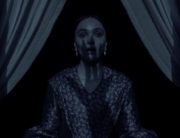
Louse Jameson and Tom Baker in DOCTOR WHO: THE FACE OF EVIL (BBC)
Too Weird, Too Wonderful: Home Video Releases You Won’t Want To Miss
Battle Royale: The Complete Collection
With all the renewed attention that Kinji Fukasaku’s 2000 cult hit has received during the run-up to, and the aftermath of, The Hunger Games release, it’s no surprise that a new home video release has appeared on the scene. What fans couldn’t have predicted is the comprehensiveness and stunning packaging of this four-disc set from Anchor Bay. Both far more horrifying and far more humanistic than The Hunger Games film—Battle Royale pits classmates against each other, not kids randomly drawn from across a nation—the film is due a critical reappraisal completely apart from the question of its influence on author Suzanne Collins. A second “director’s cut” version included in this release tends to emphasize the story’s inherent sentimentalism as it provides more flashbacks to life in school, scenes that, unfortunately, dilute the film’s power. The 2003 sequel, also included, is not nearly as impressive but is still worth checking out. A fourth disc, with tons of extras, officially places this release into the category of overwhelm.
Doctor Who: The Face of Evil and Doctor Who: The Tomb of the Cybermen Special Edition
In The Face of Evil (1977), Tom Baker, who happens to be right up there among my favorite Doctors, must contend with a primitive tribe that appears to worship… well, that would be telling. Both cerebral and pulpy (much of the action takes place in a jungle), the story depicts the Doctor at his unflappable best. The Tomb of the Cybermen (1967), which features bad guys who anticipate Star Trek’s Borg (except that they’re taller), is a marvelously giddy concoction of 1940s-style serials, 1950s live-TV awkwardness, and even silent era sci-fi in the Fritz Lang vein. Presented in gloriously grainy and evocative black and white, Cybermen comes with an entire second disc that’s chock full of bonus features, many of which will be musts for Whovians. Like Evil, it has commentary from some of the actors that’s simply a delight to listen to. Full of mocking wit and reverence at the same time, the commentaries make you want to watch these adventures again pretty much as soon as you finish your first viewing.
True Story of a Woman in Jail: Sex Hell
If you’re unfamiliar with the remarkable, quasi-exploitation films that the Japanese studio Nikkatsu released in the 1970s, then this might be a great place to start (the Impulse Pictures label is releasing several more titles over the next few months). I say “quasi” not because there’s any lack of very strong exploitation elements in these films, and this one is no exception, but because there are also plenty of unexpected moments of deep feeling, which is rather unlike the comparable American product of the same period. In addition, a film such as Koyu Ohara’s True Story is more anti-erotic than erotic, often going for unbridled disgust—and then surprising us with its scenes of utterly disarming soulfulness. Just watch the first few minutes, or brace yourself for the oddly haunting conclusion, and you’ll see what I mean. On the surface this might resemble a women-in-prison flick of the type once produced by Roger Corman, but it’s so different in tone (both more extreme and more sincere) that it’s really not to be dismissed.

Roger Corman on the set of BLOODY MAMA, 1970 (Anchor Bay Films)
Corman’s World: Exploits of a Hollywood Rebel
Speak of the devil… the legendary producer and director gets a career-spanning and massively entertaining tribute in this recent doc. One of my favorite films of 2011, and one that was ridiculously under-seen in theaters, Corman’s World is now the kind of home video release that you should consider getting as a gift for any cinephile friend of yours who’s interested in exploitation film, genre film, or indie filmmaking. In addition to the trailer, the disc contains about 28 minutes of extras, which are divided between extended interviews and personal messages of thanks to Corman. These do not overstay their welcome but also hardly represent the riches I expected after speaking with director Alex Stapleton last fall. I guess one can only hope and pray for a deluxe edition to appear someday.
Trippin’
Kudos to Camp Motion Pictures for making Devi Snively’s winning horror-comedy available for the home video market—I might not have ever discovered it otherwise. With a very likable and solid cast, Trippin’ (2011) does not at all rely on drug-related or stoner humor as the title might imply. In that sense, the title is as misleading as that of 2011’s Rabies, a film that it closely resembles thematically. But it’s difficult to discuss Trippin’ without providing spoilers, so let me just say that you’ll have fun trying to predict what will happen next in this creative indie offering. And I know it’s corny to describe a filmmaker as a “talent worth keeping an eye on,” but that phrase is tailor-made for Ms. Snively.
The Double Hour

Ksenia Rappoport in THE DOUBLE HOUR (The Film Society of Film Society)
Have you ever been unsure about which genre you’re in the mood for? If that should occur again, then please know that The Double Hour is thoroughly capable of scratching more than one itch. Masterfully blending a variety of genres—horror, noir, and romance—director Giuseppe Capatondi crafts an unforgettable experience that is at turns tragic, exhilarating, and exquisitely mysterious. Briefly reviewed by Film-Forward back in 2010, The Double Hour can now find, one hopes, the huge beyond-the-art-house audience it so well deserves. What’s more, this DVD includes a behind-the-scenes short that is far more informative than those that typically make their way on to home video releases. Here you really get a sense of how the creative team worked hard to make the complex, occasionally deceptive, plot work so well in the finished product.
Elite Squad: The Enemy Within
For my money this was by far the smartest and most compelling crime thriller from any country in 2011. Director José Padilha returns to the mean streets of Rio, but this in no way feels like a retread. So if for any reason you were under the impression that this was just another sequel, please, you need to correct that at your earliest convenience. To put it bluntly, Elite Squad: The Enemy Within is one of the scariest movies about corruption you’re likely to see, ever. Indeed, the inclusion of a 57-minute making-of featurette (not 45 minutes, as the back cover states) might seem like overkill unless you’ve seen the film and have thus come to appreciate its complexity and depth. Real-life counterparts to the fictional characters are discussed as well as the film’s relation to Brazilian politics and cinema.
The Burning Moon
Some horror films work because you’re filled with revulsion at the evil that the characters perpetrate on each other—The Burning Moon works because you wonder about the sanity of the filmmakers. I say that with less seriousness than you might imagine, though. Indeed, the incongruous combination of outright absurdity and shameless depravity has rarely been this potent. Horribly lit and often laughably acted, The Burning Moon is notable not for its craft but for its sheer excess—a stupefying, ultra-gory descent into hell itself marks the conclusion of this 1992 German effort… although it’s not as if the first parts of the film aren’t sicker than the vast majority of transgressive horror flicks out there. Oh, and there happens to be a 47-minute making-of extra on this long-awaited DVD from Intervision, but to be honest, I’m too afraid to check it out. Just give me some time.
Nina: Crazy Suicide Girl
I’ve saved what may be the most bizarre release for last. This ultra-indie negative-budget Italian flick can best be summed up by… well, the strangeness of its very title. Combining a ’70s-style occult “shocker” about ritual sacrifice, a few giallo-like trappings, lots of film-within-film, completely random nudity, and a title character who’s like an urban ninja action heroine, Nina: Crazy Suicide Girl will be released in June, but I thought I’d tell you about it now so you could prepare yourself. The disc comes with a photo slideshow and a bio. Here’s an excerpt from the latter: “At the moment [writer-director] Christian Arioli is working on his next feature, Dark Fairytale, an interesting fantasy movie.” Let’s hope that Chemical Burn distributes that one as well.
















Leave A Comment